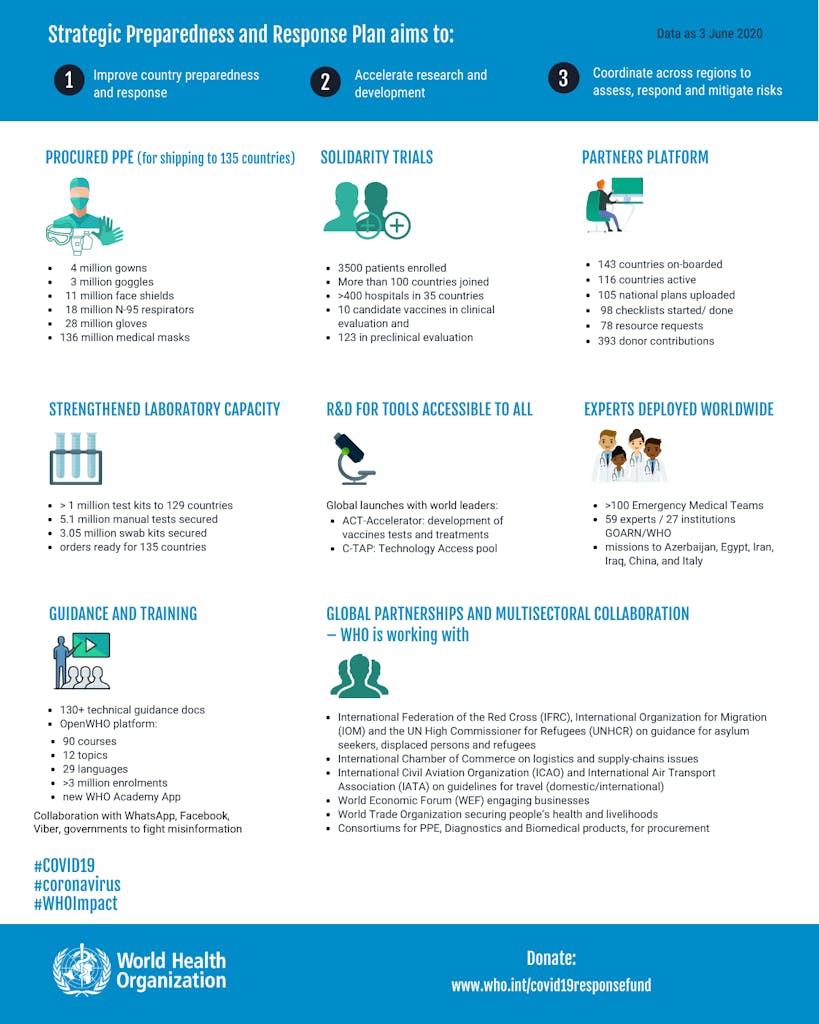We went looking for the helpers and we found them — 530,000 and counting, to be exact.
In response to the COVID-19 pandemic, a global community has rallied to support the United Nations — and the World Health Organization in particular — to stop the spread.
Since its launch in March, the COVID-19 Solidarity Response Fund for WHO has raised nearly $225 million in donations from more than 530,000 people across the globe and more than 150 companies.
The Fund supports WHO’s leadership fighting the virus all over the world. It is the foremost way for individuals, companies, and philanthropies to directly support WHO’s global pandemic response to ensure that all nations are able to prevent, detect, and respond to the virus, and it’s also the fastest way to get money where it’s needed most.
Combating COVID-19 remains an urgent task on an unprecedented scale. Even as many countries are easing restrictions from quarantine and lockdown, infection rates are spiking — and in some cases, resurging — in many parts of the world, including the United States.
“Global solidarity is not just an abstract ideal,” UN Deputy Secretary-General Amina J. Mohammed said recently. “It is our duty and our calling to come together and help each other.”
From concerned citizens to social media influencers to major global brands, the solidarity movement includes such supporters as husband, father, and cancer survivor Joshua “DiMez” DiMezza, who joined members of the online gaming community to raise tens of thousands of dollars for the global COVID-19 response; a devoted daughter in Ireland named Karen Forde who launched a fitness challenge in honor of her high-risk parents; and even pop star Lady Gaga, who personally called Apple CEO Tim Cook during a live, late-night interview to ask the company to donate to the fund. (It did).
GENEROSITY AT WORK
The Fund’s work encompasses all parts of the UN system, including WHO’s humanitarian sister agencies the World Food Programme (WFP), the UN Refugee Agency (UNHCR), and the UN Children’s Fund (UNICEF), and is happening on two key fronts: equipping frontline health workers across the world with lifesaving equipment, supplies, and information, and accelerating behind-the-scenes efforts to find effective testing, treatments, and vaccines.

DELIVERING HOPE
The COVID-19 pandemic continues to have vast repercussions on global supply chains as a result of border closures, import/export and port restrictions, reduced commercial aviation and shipping operations, and restrictions on movement to/from and within countries.
These disruptions have made the UN’s global transportation and logistics expertise even more vital. Donations are helping the World Food Programme transport medical equipment, supplies, and humanitarian relief to the planet’s most vulnerable areas.
As much of the 🌍’s commercial transport was grounded, WFP has stepped in to move passengers & essential health supplies to countries isolated by #COVID19 pandemic.
A critical lack of funds may put an end to this the third week of July. Help us keep WFP’s transport fleet moving. pic.twitter.com/UIQ7L90AxA
— World Food Programme (@WFP) June 24, 2020
WFP has set up and started three strategic consolidation hubs in Guangzhou (China), Liege (Belgium), and Dubai (United Arab Emirates), along with regional staging areas in Accra (Ghana), Addis Ababa (Ethiopia), Kuala Lumpur (Malaysia), Panama City (Panama), and Johannesburg (South Africa). In May alone, these hubs dispatched nearly 1,700 cubic meters of COVID-19-related cargo, including ventilators, hospital equipment, pharmaceuticals and infrared thermometers, as well as medical-grade personal protective equipment (PPE).
WHO’s vast network of partners includes such nongovernmental organizations as the Coalition for Epidemic Preparedness Innovations (CEPI), which received $10 million from the fund to help speed up the development of promising COVID-19 vaccines. Four groups — Novavax, Moderna, Inovio, and the University of Oxford — are now conducting phase one clinical trials.
In May alone, the Fund disbursed $43.2 million at the direction of a steering committee composed of WHO senior leadership and based on the agency’s global strategy:
- $20 million to WFP to scale up global logistics so essential supplies can reach those most in need.
- $15.2 million to WHO to procure and distribute essential medical supplies, such as PPE, testing kits, and biomedical equipment.
- $5 million to WHO for Africa CDC to strengthen the continent’s response to the pandemic, including support for vulnerable women and girls.
- $3 million for WHO’s Unity Studies to better understand how COVID-19 spreads.
With the virus infecting roughly 1 million people per week worldwide, many low-income countries are struggling to obtain oxygen concentrators — a simple yet essential medical supply that helps COVID-19 patients suffering from potentially fatal low oxygen levels. Because 80 percent of the market is owned by just a few companies, demand is outstripping supply.
That’s why WHO and other UN partners are working with manufacturers across the world through a variety of private sector networks to buy oxygen concentrators for countries that need them most. WHO is also helping countries buy equipment to generate concentrated oxygen in larger amounts as a more sustainable solution to the pandemic.
And thanks to its longstanding collaboration with UNICEF and the Bill & Melinda Gates Foundation, WHO had already been researching smarter ways to deliver oxygen to nations in need — not just because of the pandemic, but also because oxygen can save children with pneumonia and babies born prematurely.
Donations to the Fund are also supporting UNICEF’s work in vulnerable countries with access to evidence-based information; access to water, sanitation, and hygiene; and basic infection prevention and control measures, as well as access to care for vulnerable families and children. Recently, $10 million in Fund donations went toward UNHCR’s work in South Sudan, Bangladesh, and Syria.
We’re still learning about COVID-19, but one thing is clear: We can’t defeat it without a sustained and united effort. UN agencies are coming together, coordinated by WHO, to reach as many people as possible.
DONATE TODAY
Every donation makes a difference. Support WHO’s lifesaving efforts to respond to the COVID-19 pandemic by giving to the COVID-19 Solidarity Response Fund. Donations made via Facebook will be matched up to $10 million.


